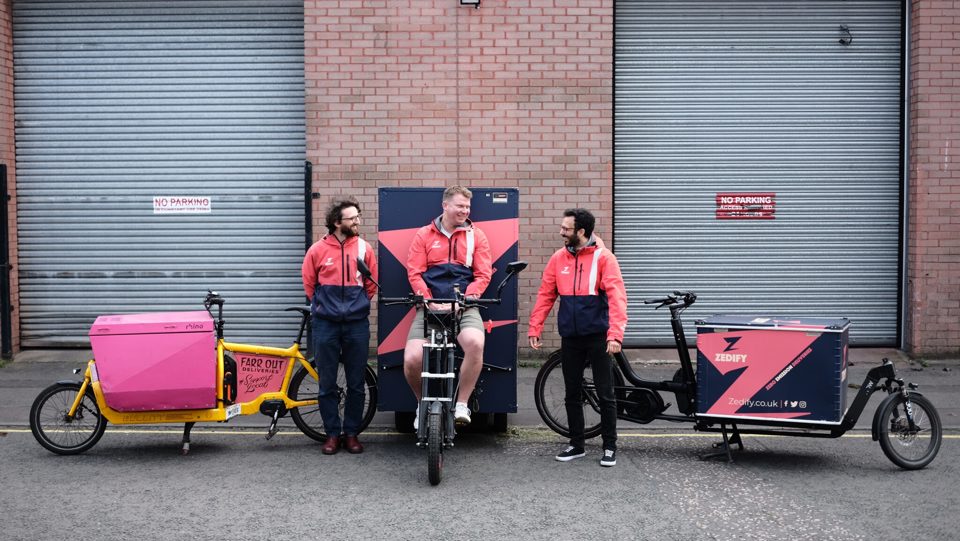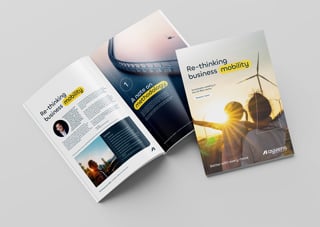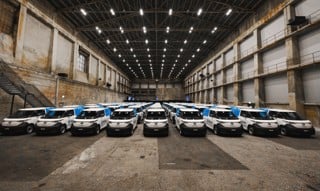What’s more efficient than a van, faster in urban traffic, cheaper to run and cuts emissions? Many firms may not consider the humble e-cargo cycle a feasible alternative to a diesel, or even electric van, but a growing number of businesses are proving the case for ever more possibilities for pedal power.
Among the pressing challenges facing fleet operators is the green transition – from Net Zero, to growing urban congestion and emissions-based charging zones. While these challenges can present opportunities, at the moment things are moving in the wrong direction: more than a million vans have been added to UK roads 2014-2023, most of them diesel – a trend accelerated with a pandemic-induced online shopping boom.
This is a trend with a supposed end: by 2035 the government wants to end sales of new diesel vehicles. By 2026 electric vans will become cheaper than diesel to run, according to one estimate, but businesses can only reap those rewards if they can access those EVs. The industry recently raised the alarm over slow uptake and inadequate charging infrastructure.
‘Active travel’ (cycling and walking) measures like Low Traffic Neighbourhoods are encouraging shifts away from large vehicles in busy urban areas – and electric vehicles are at as much of a disadvantage as diesel vans in a traffic jam.
From cargo bikes capable of transporting up to 300kg – the same as the 39% of delivery vans in London running around three-quarters empty – to bike commuting policies helping keep staff fit and healthy, and cutting car parking demand, there’s a lot cycling can do for businesses.
Rob King runs the UK’s largest e-cargo bike delivery network, Zedify, which delivers in ten towns and cities, from Brighton to Glasgow, London, Manchester and Birmingham. Among their customers are Zara retail, and Zedify collaborates with Evri to deliver ‘thousands of parcels a day’ within Bristol’s clean air zone.
eCargo bikes cut emissions by 80%
King says: “We've proven that we can be much more efficient in cities, and some of the studies we've done say that's around 13% more efficient. In a penny margin business, that's really important.”
eCargo bikes can save 80% of CO2 emissions per km, compared even to electric vans, and one logistics study found a business handling two billion parcels annually could save as much as £550m by 2030 by switching 60% of its parcels to e-cargo.
Says King: “Look at some of the things that city councils and local authorities are doing, whether it's a clean air zone or a congestion zone… those are the things that give us a competitive advantage”.
“Where Waltham forest put in modal filters , suddenly it takes a van an hour to get around, where it only takes a cargo bike 10 minutes.”
Dan Parsons, of e-cargo retailer and service centre, Fully Charged, in central London, adds: “You’re able to drop off more”. Absolutely, which has operated in London since 1865, were struggling to maintain service level, and retain drivers, in an increasingly congested city. Vans were causing “nothing but disadvantage”, Head of Absolutely Sameday, Doug Hutchinson said, while e-assist cargo bikes help riders carry the same as a small van all week, without getting exhausted. The company estimates riders can make 30 deliveries per day, versus 10-12 with the vans, without ULEZ charges, parking fees or fines.
Dan Parsons adds a cargo bike “allows you to ride from the point of collection to the kerbside without fear of parking restrictions, pedestrianised areas, things that would slow you down in a van.”
For larger firms, Parsons says, it’s “the CO2 savings, the efficiency, the finances” that are attractive. “By delivering more over a given time, that’s more productivity and profitability all while saving the planet and meeting carbon reduction targets.”
Fleets responsible for 'greening' delivery miles
Advocacy body, Transport and Environment (T&E), argues with corporate fleets owning 58% of all the vans in the UK and driving 76% of the van mileage, “they have a responsibility to make those miles as green as possible.” Choosing cycle-based delivery firms can also cut Scope 3 emissions, those relating not to a business’ direct emissions, but to its external activities, such as office deliveries.
Then there’s the wow factor, the brand glow-up for business customers looking to flex their green credentials. Says King: “Certainly from the retailers we speak to, the customers we speak to, they love what we do. That's always the feedback we get from our customers: ‘you do this stuff much better than a van, because turning up on a cargo bike looks and feels right’. Typically, those riders haven't been caught up in traffic, they tend to be happier and smiley, and that doorstep experience is really fantastic. That's the bit that really sells: it is the association with the brand.”
However, as with every new technology there are skills shortages (see 'Skills Shortfall' below), as well as financing and insurance gaps, and the issue of training up riders. Some van drivers like their warm, dry cabs, while others will prefer the predictability of a bike, being out in the fresh air without traffic jams. Cargo bike delivery firm, PedalMe, has developed a professional cargo bike rider course for companies wanting to retrain drivers, teaching safe operation and loading, among other things https://pedalme.co.uk/training. The company and its operations are also FORS accredited.
Then there’s the infrastructure challenges. While a van can collect goods from a Midlands depot at midnight and deliver to central London within hours, cargo bikes need micro-depots in the suburbs which largely don’t yet exist. T&E says a clear plan is needed for ‘exploring setting up zero-emission logistics zones to speed up the shift to electric delivery vans and cargo bikes in urban areas.’
Councils like the City of London have experimented with shared hubs, but the sites haven’t always been suitable. Zedify manages its own. “By having those micro hubs really close to where your customers are, you can deliver more volume,” says King. “While even a fairly large van only does one big trip in a day, our cargo bikes will typically do two, three or four routes in a day and go back and forth, so they're mostly full, rather than being mostly empty.”
It's not just specialist companies turning to bikes, large operators are cottoning on too. Amazon recently announced a £300 million UK investment in cargo bikes, and micromobility delivery hubs, including in Norwich. As King notes: “That's huge. That creates demand for the market, showing that actually this is a really interesting space.”
He adds: “I think it's all going in one direction. You can't just keep putting more and more vans on the roads. You've got to find better, more efficient ways of moving stuff around cities, because otherwise it will be gridlock. It's a very simple thing to see what's coming: as the years go on and more and more deliveries happen, we've got to find other ways of doing it, and for us, it's looking at that wholesale change of the infrastructure around how you can utilize cargo bikes.”
And while finance for vans is readily available, for cargo bikes a patchwork of subsidies hasn’t been enough for many operators to switch. King, unsurprisingly, points to subcontractors like Zedify, as a solution for companies new to the sector. See also: B2C delivery firms like PedalMe in London.
Pedal-powering the workforce
The UK’s workforce is among the sickest in Europe, resulting in work absences and long-term illness – and physical inactivity is responsible for one in six premature deaths. While most people drive to work, cycling all or part of a commute, in combination with public transport, is possible, given the right incentives and infrastructure. Staff who cycle to work are happier, healthier and take fewer sick days.
Cycling UK, the national cycling charity, operates a Cycle Friendly Employers (CFE) scheme, to help companies boost active commuting. After an initial workplace assessment, the charity will set out a pathway for improvement, anything from secure cycle parking, showers and lockers, to workplace events, like bike breakfasts. Employers can sign up for free to the Cycle to Work scheme –where staff can buy a bike tax free. Current CFEs, with bronze silver or gold accreditation, include companies with 10 staff, to NHS trusts with 5,000 employees.
Says Turney leads the programme. He says: “Either companies have spent some money on facilities or incentives, things like Cycle To Work Scheme, or Doctor Bike or new bike sheds, and they want some sort of acknowledgement. The other are those thinking a year, two years, five years down the road and they aren’t sure how to meet their Net Zero goals. Accreditation acknowledges where they are but also gives them a roadmap and direction of travel as to what they can do.” Businesses realise cutting employee transport carbon is an ‘easy win’. He says it also helps attract and retain staff, who are increasingly selective over where they work, not least in terms of that company’s ESG.
Skills shortfall
Cargo cycles are a relatively new technology, but a few models are emerging as reliable industry favourites, including the Urban Arrow. The network of repair centres that ICE or even electric vehicles enjoy isn’t as established yet either. Some specialist cycle repair companies do offer the kinds of service you might expect of a traditional service centre, however. In central London, Fully Charged sells and maintains fleets of cargo bikes for a number of freight and local B2C businesses. London courier firm, Absolutely, and even construction giant, Conway, have used their services. Bike maintenance firm Fettle has stores in nine cities, including in London, and works with Zapp, Ocado and FedEx, and offers corporate servicing for fleets of “2 or 200+” cargo and e-cargo bikes. Fettle even offers a roadside rescue service, at a cost. Four-wheeled Electric Assisted Vehicles, which look like small vans, only with a bicycle cockpit in the front, appointed Halfords as its fleet service, maintenance and repair partner, as part of an after-sales package, including at remote locations. Larger fleets would likely repair their own machines, as roadside rescue can be pricey.




















Login to comment
Comments
No comments have been made yet.